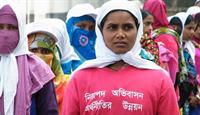Bangladesh garment workers need union advocacy, says Ms. Kalpona Akter

Dhaka, BANGLADESH: Horrendous factory fires and other disasters have alerted the public worldwide to the labor exploitation of garment workers in Bangladesh. But even with improvements on a new focus in Bangladesh to make factory buildings more safe, it’s not time to let up on public pressure under and industry that has too often shown little regard for women who work in the textile industries.
Kalpona Akter, a former child factory worker and now Executive Director of Bangladesh Center for Worker Solidarity, speaks out about the current needs and conditions for women most people don’t even consider when they buy clothes.
“The bottom line is, we need these jobs. It is important for those females who work in the factory to work these jobs with dignity and in a dignified way,” says Akter during her recent radio interview.
Safety through a dignified place to work, along with a union representative voice for workers is what’s needed say union advocate, Kalpona Akter.
As the Executive Director of Bangladesh Center for Worker Solidarity Akter’s strong advocacy has been getting more human rights and worker’s rights for women working inside the garment industry in the region. Akter’s experience as a garment worker herself is part of the fuel that keeps her going as a voice for women who have worked under an industry that has been rife with deplorable conditions.
In this interview Akter outlines how one piece of ‘high-end’ clothing that sells for hundreds of dollars in the West is the same piece of clothing that garment workers only get paid ten cents (USD) to produce. Some of the large Western buyers of Bangladesh clothing from the Rana Plaza Complex, the garment factory where 1,100 workers died during a factory fire, are still not paying any money to the families of those who died in the fires.
Akter describes a searing account of the Rana Plaza fire where mostly women workers were locked in and unable to get out of the burning factory building, causing death to those who were trapped. Tuesday, 17 December 2013